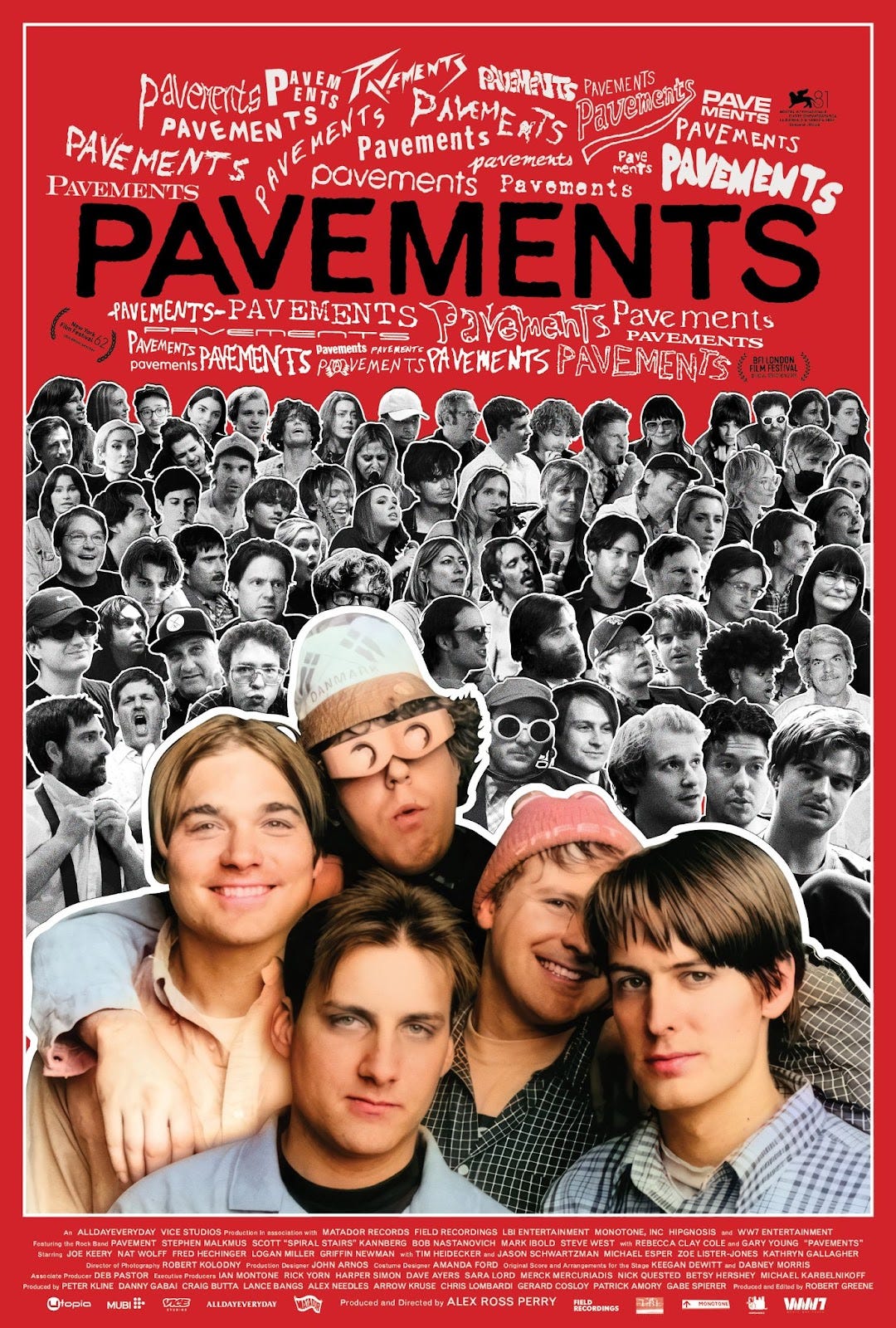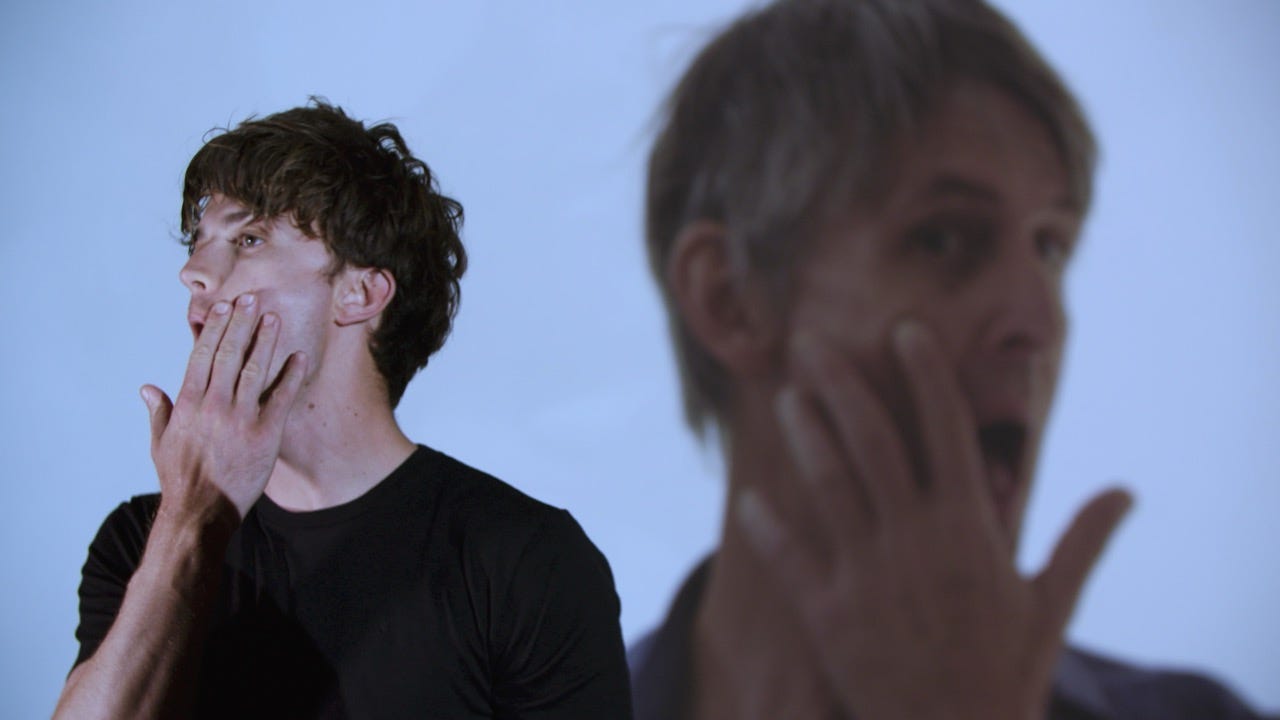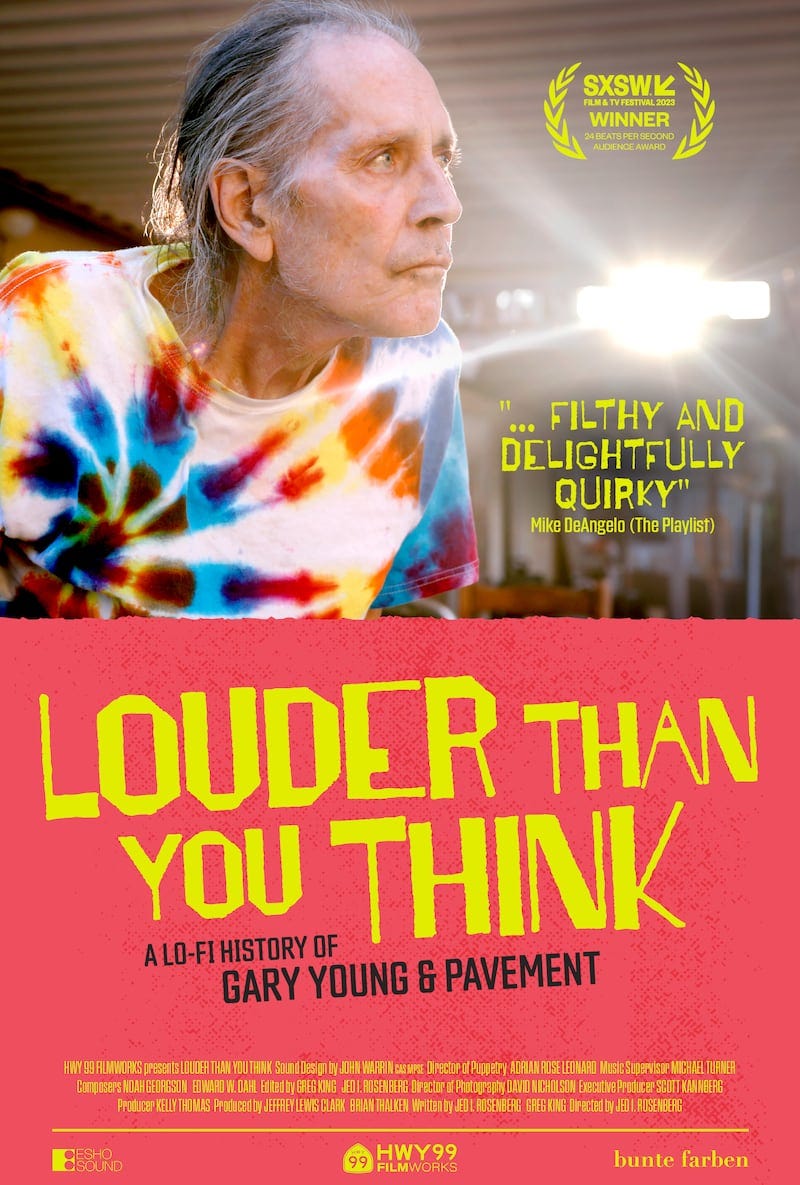Success, it never comes
Pavement, "Pavements," and Gary Young standing everything on its head. Plus, it's almost Frog Eyes Friday
In one old interview clip in the new hybrid documentary Pavements, Stephen Malkmus says, looking back on the album Crooked Rain, Crooked Rain, “It’s like I’m taking music that kinda made me feel sick a little bit, but trying to make it good. Like classic rock … or the Eagles … I still do that. I don’t know why I’m compelled to do that.”
Director Alex Ross Perry did the same when he was asked to make a movie about Malkmus’s band, Pavement: He looked at the worn-out clichés of music docs and biopics and tried to imagine a way to make them good. In both cases, that involves what other people might call ruining them. Pavement takes catchy rock tunes and pours noise and lyrical nonsequiturs all over them. And Pavements—which has its Toronto premiere Saturday night (May 17) at both Hot Docs and the Fox Theatre—takes the story of a beloved 1990s rock band and fractures, falsifies, and mirrors it until you can just barely follow. Each can leave audiences wondering whether it’s a cynical joke.
In that sense, Pavements is theoretically the perfect way to make a Pavement movie—which their label Matador thought they should, for the occasion of their 2022-2024 reunion tour, because both Pavement and music movies have been having a moment. Yet while I’m absolutely among the target audience for this film, for both the music and the playful deconstructionist aesthetic, I had mixed feelings after two viewings.
A Pavement doc is somewhat of a silly and superfluous prospect, and the fact that the film loudly knows that doesn’t exactly undo it. (It also doesn’t mean all music movies are silly and superfluous.) At times I wondered if I would trade this hypercomplex multilayered project for one really high quality concert film. There is a previous Pavement documentary from 2002, Lance Bang’s Slow Century. Loose and lo-fi as it is, much of it is reused in Pavements because that’s most of the archival footage there is. But more importantly, Pavement’s story isn’t much of a story: A handful of smart, funny white guys from the suburbs (some in California, some in Virginia) put together a band after college, had a good run for nearly a decade, then broke up for all the reasons bands usually do.
They also tended to be reticent and sarcastic, or “brats,” as Malkmus admits. Being interviewed was clearly the part of the job he hated most (he even says it’s a big part of why he quit in 1999). So some of those old clips are kind of unpleasant to watch, by contrast with the affable older guy in the current rehearsal and backstage scenes.
The one thing that heightens the stakes is that Pavement was a rock band in a particularly weird time for rock bands. REM and then Nirvana had brought the postpunk underground to wider notice, and at first that seemed like a whole new phase. It turned out to be more like rock’s denouement. Pavement was often seen, as percussionist and onstage pep leader Bob Nostanovich puts it at one point, as the “most eligible” indie band for mainstream success. But it never happened. No big reason but that their aesthetic was at base antithetical to it. It’s like Nirvana made the world say, “Wow, maybe this?” and Pavement was there to make it say, “On second thought, no.”
Thanks to hip moms and dads and the internet, more people know Pavement now than ever did back then. Young bands namecheck them; even the Barbie movie did. This reunion tour let them play big festivals and lush theatres (not arenas). The two weeks spent preparing for it was probably the longest they ever rehearsed. “It’s weird to be better when it doesn’t really matter,” Malkmus says in the film. “I kinda wish… There’s good things about being lackadaisical, but also … like, this is all done, so you are just re-creating something. There’s no next thing.”
The only gold record Pavement ever earned came last year, due to the obscure B-side “Harness Your Hopes” becoming a TikTok phenom. When Perry shows Malkmus gesturing to the gold (half-million-selling) and platinum (million-selling) albums on the wall of the pop-up “Pavement Museum” that was constructed and put on public display expressly for the movie, that’s a joke/lie. Likewise the vitrines displaying an MTV award, or Pavement in magazine ads for Apple and Absolut Vodka (copying the Wowee Zowee cover design with the words “Vodka Wodka!”)—none of that ever happened. These concoctions are scattered through the exhibit alongside old posters, T-shirts, lyric notebook pages, and other actual artifacts.
In the nineties we might have called this culture jamming or reality hacking. Today it brings more to mind viral disinformation, though in a mostly harmless way. (Reportedly it was influenced here by Martin Scorsese and Bob Dylan’s documentary about the Rolling Thunder Revue, which in the surreal spirit of that 1975-76 tour was peppered with made-up anecdotes amid the true ones.)
In parallel with the phony-but-real museum, Perry also cooks up a pretend biopic, casting young actors as the members of Pavement and the heads of Matador (comedian Tim Heidecker plays Gerard Cosloy and Jason Schwartzman plays Chris Lombardi). The film-within-the-film, set in 1995, gets its mock-drama from hyping up tensions over the band’s ambitions between Malkmus and co-founder Scott Kannberg aka Spiral Stairs, as well as with Matador, like refusing to play Saturday Night Live (I’m not sure if that really happened).
Much more amusing is the running “behind the scenes” thread of actor Joe Keery taking a cartoonishly Method approach to portraying “Malkmus.”
He goes to the former site of the Whitney Museum (which had become part of the Frick) to see if he can “pick up a couple of night shifts” doing Malkmus’s post-collegiate job as a gallery security guard.1 He strains to get just the right California vocal fry with his voice coach, who encourages him to try to obtain a photo of Malkmus’s tongue. This routine nails the hype around performances like Timothy Chalamet’s Dylan or Rami Malek’s Freddy Mercury. Keery kills it playing straight the absurdity of treating Malkmus as an epic hero character.
Most sublime of all is the footage of the off-Broadway Pavement “jukebox musical” that Perry actually staged as a three-day public workshop production in December of 2022, under the inspired title Slanted! Enchanted! Perry explains it as an experiment to combine the most sardonic rock band with the most earnest art form. We get to see the casting process, some of the rehearsals, and scenes from the live show (with actual Broadway actors like Kathryn Gallagher and Michael Esper). They turn out to be the heart of the whole movie. Intercut with footage from past and present Pavement concerts, the show’s closing medley of a half-dozen Pavement songs serves as the real climax of the film. (While also sotto voce hinting that Pavement songs are kind of interchangeable.)
These performances uncover a depth of emotion in the songs that the band itself was loath to acknowledge—not that Pavement recordings don’t have feelings, but they always seem reluctant or outright chagrined to be having them, and usually undercut them with squalls of dissonance or twists into witty abstraction. Not so in the musical theatre version, which returns in reverse Pavement’s gesture of ruining songs to make them better.
The scenes from the musical made me kind of wish that was the whole movie. As it is, all the elements, each clever on their own, become a bit much. Deliberately so, but still. It could be worse—apparently it was, the first time it was screened (the band was not pleased), and editor Robert Greene did emergency work. But it’s still, say, 20 minutes too long. The jokes wear thin on one side and the real-life reunion starts to feel sentimentalized on the other. The conceit of sending up rock docs and biopics deteriorates when the film slides into its own indulgences.
I still recommend it highly to Pavement lovers. What I can’t figure is how it would read to the uninitiated. Do the great things about the band even come across amid all the feints and dodges? I can’t tell.
By contrast, there is another recent Pavement film I would recommend without reservation, no matter someone’s familiarity level with the band. That’s because I fibbed when I said there’s nothing to Pavement’s backstory. There is one truly distinctive, comic and tragic tale in that timeline—and that is the story of Gary Young, who gets only a few quick nods in Pavements.
As we see in 2023’s Louder Than You Think: A Lo-Fi History of Gary Young and Pavement, Young was Pavement’s original drummer, an “old hippy” neighbour of Malkmus’ and Kannberg’s in Stockton, CA—40ish to their 20ish in the late 1980s, when he recorded and played on the first ever Pavement tracks in his studio. His extravagant drumroll-filled style, more influenced by Yes’s Bill Bruford than any cool punk drummer, just made “SM” and “Spiral”’s detuned-guitar gambits sound more unhinged. Later they decided to invite him to go on the road.
The shirtless middle-aged dude on stage was a surprising enough presence to the kids in the crowds, but that was trebled by what he did there. He was constantly leaving the drum kit to do headstands and stage dive and sometimes just fall off the stage. He developed a performance ritual before every show of handing out hundreds of some category of item—leaves, or pennies, or scoops of mashed potatoes—to everyone in the audience. I can testify that in the early days of Pavement, people talked as much about “Gary” as they did about anything else.
But Young was also a patchily functional alcoholic—Nastanovich was brought into the band partly as a fallback plan for the times Young was too drunk to drum. He also didn’t really grasp the indie scene and ethos; he assumed the touring and press attention must be leading to rock-star money, and began to get irritated and paranoid when it didn’t materialize. One day in 1993 he declared he was quitting, as a pressure tactic. The band decided to let him.
Among the makers of this film, directed by Jed I. Rosenberg, were several Stockton locals who’d known Young for years. So they got a great deal of access to him, for a patch in the 2000s and then again a few years ago, shooting while hanging out with him and his wife Geri in his house and studio, both of which Young openly acknowledged were bought on weed-dealing money.
They very frankly tell his peripatetic life story, as well as the Pavement years and what came after. But mostly they bask in the voluble, hyperactive, vodka-and-juice soaked, later perpetually hunched over (sciatica), but always absolutely charming aura of Young. You can tell everyone in the band loved him, especially Kannberg and Nostanovich, who talk here at length (Kannberg also joined in as a producer). Despite all of Young’s incorrigibility, one can easily see why.
And in the process, one also understands something about the warmer side of Pavement as a band, and the ways in which their admirably tolerant and accepting attitudes toward Young might be reflected in the expansiveness of the music. It changed how Pavement sounded to me.
Young died at age 70 in 2023. But he lived long enough to attend the premiere of his documentary. He handed out bananas to the audience, and he heckled the movie from his seat.
Plus: Frog Eyes Friday
Locals interested in bands that share Pavement influences like Pere Ubu, Tall Dwarfs, or the Fall should be aware that this weekend also brings to Toronto a rare visitation (always a visitation, never just a visit!) from Vancouver/Victoria’s Frog Eyes.
That’s visionary Carey Mercer’s long-running band, part of the Destroyer/Sunset Rubdown/Wolf Parade/Handsome Furs musical spider web, but with its own Whitman-esque eco-historical epical-poetical-fantastical bent. The group also includes Mercer’s partner Melanie Campbell on drums, Ryan Beattie on bass, and Shyla Seller on vox and keys.
Frog Eyes has a superb new album called The Open Up that I think is their best in about a decade.
They’re at the Dance Cave (above Lee’s Palace) on Friday (May 16) for an early show: doors at 6 pm, openers Fortunato Durutti Marinetti on at 7, and F.E. at 8 pm. Meet you there.
Malkmus worked there, of course, along with the late David Berman, leader of Silver Jews—who, by the way, is mentioned and appears several other times, most notably screaming at the crowd after the infamous 1995 Lollapalooza show in West Virigina where the band got pelted with mud. One addition here from the Slow Century version is some backstage footage where they all seem in remarkably good spirits afterwards, contrary to some versions of that very minor myth.







So many great points here about Pavements. I'm somewhere between ardent fan and casual observer, so I think I got about 60% of the references. Still, agree the film is too long. Though the film teeters between hagio and anti-hagio, it did make me wonder whether it would have felt tighter if made by people who weren't such huge fans. At a Q&A after the film, Greene went on at length about his love for the band, which kind of exposed one of the film's flaws. They just didn't know when or how to end it, if in fact they even wanted to.
Yeah Louder than You Think was a great watch